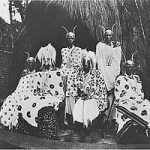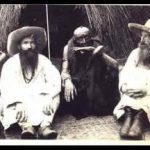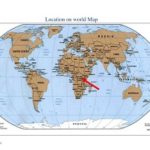Special Crops: Eucalyptus, Tobacco, Coffee
Eucalyptus. — Trees are not a crop in the usual sense of the word, but they are treated here because this will be the only reference to them, and a separate section on forestry is not warranted. According some authorities, the soil was in the past systematically depleted of its forests, by the agriculturalists forever seeking new land. Large sections of Ruanda still have practically no trees at all.
The Belgian administration undertook to carry out a forest reclamation project. The peasants were made to plant communal groves of fast-growing trees, particularly eucalyptus, to be used as firewood and in construction. At the time of the author’s investigation, the countryside was once again well stocked, but there was a tendency among the people to neglect maintenance of these groves because the administration no longer demanded it.
Tobacco. Tobacco is grown in small quantities and not by everyone every year. The people of Remera buy it from each other. There are at least three recognized varieties.
Tobacco is prepared by each individual in different ways, but is never “cured” in our sense of the word.
Both men and women smoke pipes, although it is not considered proper for a woman to smoke in the company of her husband.
Coffee. — Coffee is the only cash crop. It was introduced by the Belgian administration. It demands great care — first in planting, and then in maintenance. At the beginning of the dry season (in June), the ground around the foot of each tree has to be fertilized — usually with shreds of old banana plants, — and straw has to be spread over the plantation to prevent evaporation.
The crop is gathered at the end of the dry season. The peasant producers use none of it. It is dried, parched, and sold at a price set by the government to Indian or Arab merchants in the nearest outpost market — at Kibungu or Kabarondo in the case of Remera.
Among the administration’s schemes to provide the Banyarwanda with a cash crop, coffee came nearest to attaining the goal. In spite of the repeated efforts of the administration over the years to make the cultivation of coffee easy, it was accepted by the peasants with great reluctance. The cultivators feel that its maintenance gives them too much work, so much so that the care of their individual coffee plantations had to be imposed upon them through the local chieftain.
Al the time of this investigation, coffee had won limited acceptance in Remera but many were beginning to neglect their plantations now that, once again, it was not a matter of compulsion.
A sample questionnaire was drawn up by the author, which yielded the following information:
Of 54 household heads (14 Tutsi and 40 Hutu), who were questioned, 17 (7 Tutsi and 10 Hutu), said that they had no coffee at all.
The average number of productive trees in a plantation is 103. However, this number is unrepresentative in that there is one unusual individual who has a plantation of 460 trees. An average without this individual is 91 trees per plantation.
Seven persons, who previously had no coffee, were voluntarily planting it at the time the sample was taken. These new plantations average 137 trees — one is as extensive as 300 trees — which are yet unproductive. Of the people who have productive plantations, only five recently transplanted 62 new coffee seedlings to perpetuate their existing coffee plantation. The average number of transplants is 12.
Nineteen individuals gave the cash amount which they had obtained from their coffee crop: in 1960, they averaged 918.66 francs ($18.37) and in 1959 1130 francs ($22.30). The individual who owns the 460-tree plantation was not included in these averages. He did not give the specific income from his coffee, but only his global annual income, which amounts to about 7000 francs ($140.00). Certainly more than half of this is derived from his coffee plantation.
https://uk.amateka.net/special-crops-eucalyptus-tobacco-coffee/https://uk.amateka.net/wp-content/uploads/2021/04/special.pnghttps://uk.amateka.net/wp-content/uploads/2021/04/special-150x150.pngModel CitizenshipEucalyptus. — Trees are not a crop in the usual sense of the word, but they are treated here because this will be the only reference to them, and a separate section on forestry is not warranted. According some authorities, the soil was in the past systematically depleted...BarataBarata rpierre@ikaze.netAdministratorAMATEKA | HISTORY OF RWANDA




